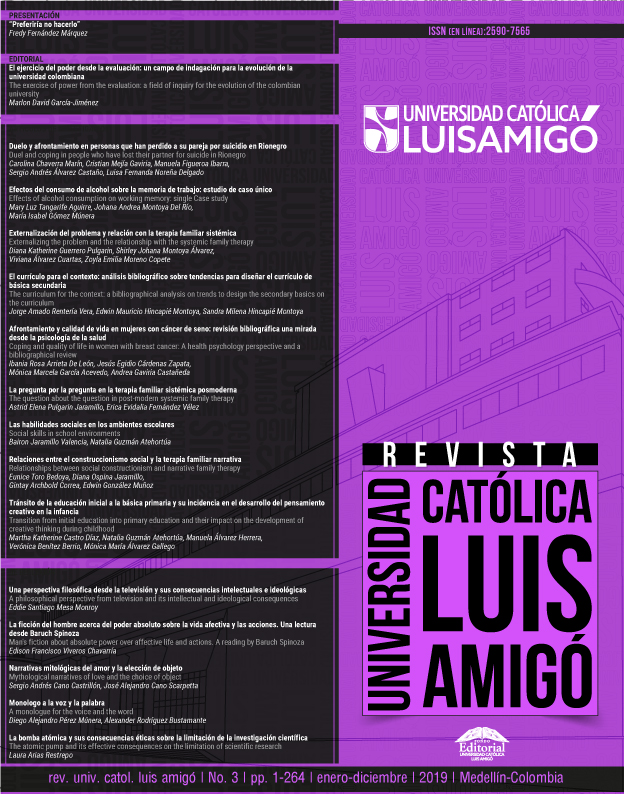A philosophical perspective from television and its intellectual and ideological consequences
DOI:
https://doi.org/10.21501/25907565.3266Keywords:
TV, Philosophy, Ideology, Knowledge, Simulation.Abstract
This hermeneutic-interpretative exercise focuses on an analysis of how the misuse of television generates a decline in it, how it can turn knowledge into a propaganda or generate an ideology and how philosophy can take advantage of this means for the evolution of its discipline since its good use, besides forming and creating the possibility of a new method for the propaedeutics of the philosophy evolving to a new system established in education and out of it. Promoting a philosophy of television as the opportunity for the concept and image to be applied in a conscious and rational way.Downloads
References
Baudrillard, J. (1993). Cultura y simulacro. Barcelona, España: Editorial Kairos.
Bourdieu, P. (2000). Sobre la televisión. Barcelona, España: Anagrama.
Cárdenas Maldonado, J. D. (2011). Entre la imagen y el pensamiento: a propósito del pensamiento de Gilles Deleuze. Universitas Philosophica, 57(28), 241-262. Recuperado de https://revistas.javeriana.edu.co/index.php/vniphilosophica/article/view/11009
Chaplin, T. (2010). La filosofía en televisión: ¿un sueño imposible? En M. Martínez-Lage. Museu d’Art Contemporani de Barcelona (MACBA), Centro Galego de Arte Contemporánea (CGAC) y Xunta de Galicia. Recuperado de http://www.macba.cat/uploads/TWM/TV_chaplin_cas.pdf
Lipovetsky, G. (2015). La estetización del mundo. Barcelona, España: Anagrama.
Ministerio de Educación Nacional, MEN. (s.f.). Televisión y Educación. Recuperado de https://www.mineducacion.gov.co/1621/article-90213.html
Onfray, M. (2008). La comunidad Filosófica. Barcelona, España: Gedisa.
Peiró, I., Grègori, S., y Merma Molina, G. (2011). Una mirada crítica a las repercusiones de la Televisión en la educación. Polis Revista Latinoamericana, 29, 1-7. Recuperado de https://journals.openedition.org/polis/2086
Srubshchik, I., y Slater, C. (Productores). (2015) Mr. Robot [serie de televisión] New York, E.U: Universal Cable Productions.
Adorno, T. A. (2009). Criticas de cultura y sociedad II. Madrid, España: Akal.
Downloads
Published
How to Cite
Issue
Section
License
PROPIEDAD INTELECTUAL
Los autores son moral y legalmente responsables del contenido de sus artículos, así como del respeto a los derechos de autor. Por lo tanto, éstos no comprometen en ningún sentido a la Universidad Católica Luis Amigó.
La reproducción de los artículos se regirá conforme a lo descrito en http://creativecommons.org/licenses/by-nc-sa/4.0/

